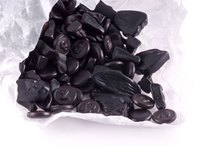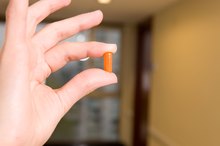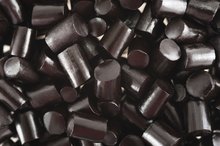What does fact checked mean?
At Healthfully, we strive to deliver objective content that is accurate and up-to-date. Our team periodically reviews articles in order to ensure content quality. The sources cited below consist of evidence from peer-reviewed journals, prominent medical organizations, academic associations, and government data.
- Linus Pauling Institute; Potassium; Jane Higdon, Ph.D.; Feb. 2004
- MedlinePlus; Licorice; April 22, 2011
The information contained on this site is for informational purposes only, and should not be used as a substitute for the advice of a professional health care provider. Please check with the appropriate physician regarding health questions and concerns. Although we strive to deliver accurate and up-to-date information, no guarantee to that effect is made.
Can Black Licorice Cause Constipation?
Traditional uses for black licorice include treatment for constipation. In that respect, black licorice generally doesn't cause constipation in most people. However, if you have a sensitive gut or suffer from any intestinal problems, licorice may trigger constipation. Similarly, eating lots of licorice might cause your system to get clogged up and bloated. Finally, in some serious cases, eating lots of licorice can cause hypokalemia, which can also include constipation symptoms.
If you are experiencing serious medical symptoms, seek emergency treatment immediately.
Black Licorice
Natural black licorice comes from the root of the licorice plant. It has a very distinctive and strong taste and a pungent smell. Many of the packs of the licorice sticks you see in stores are in fact just candies flavored with licorice. Raw licorice often features in traditional remedies, with a substance called glycyrrhizic acid thought to be the active ingredient. Uses include treatment for digestive complaints. So, when it comes to constipation, old-fashioned cures may involve licorice as a herbal solution.
- Natural black licorice comes from the root of the licorice plant.
- Raw licorice often features in traditional remedies, with a substance called glycyrrhizic acid thought to be the active ingredient.
Hypokalemia
Does Black Licorice Help Induce Labor
Learn More
Hypokalemia occurs when your blood contains very low levels of potassium. One of the symptoms of this is constipation. Eating very large amounts of black licorice can trigger hypokalemia in some very rare cases, according to Jane Higdon Ph.D., from the Linus Pauling Institute 1. Glycyrrhizic acid in licorice can trigger the body to excrete more potassium through urine. However, you're unlikely to experience this unless you eat packets of black licorice every day for two weeks or more.
- Hypokalemia occurs when your blood contains very low levels of potassium.
- Eating very large amounts of black licorice can trigger hypokalemia in some very rare cases, according to Jane Higdon Ph.D., from the Linus Pauling Institute 1.
Bowel Problems
People with certain bowel conditions may react badly to licorice. However, problems such as irritable bowel syndrome are often unpredictable. You may feel constipated, while the next person with IBS might experience diarrhea or no symptoms whatsoever. If you have IBS, celiac disease or Crohn's disease you should speak with your doctor before eating a lot of licorice. People with celiac disease, in particular, need to look out for gluten in some forms of licorice.
- People with certain bowel conditions may react badly to licorice.
- People with celiac disease, in particular, need to look out for gluten in some forms of licorice.
Considerations
Does Drinking Coffee Make You Have More Bowel Movements?
Learn More
If you're avoiding black licorice for fear of constipation, the chances are you won't experience a blocked up system from eating a small amount. The sugar and gum-filled candy black licorice may be more likely to cause constipation than raw black licorice. Avoid eating large packs in one session.
Related Articles
References
- Linus Pauling Institute; Potassium; Jane Higdon, Ph.D.; Feb. 2004
- Vanderbilt Medicine; Licorice Compound Offers Cancer Prevention Strategy; Melissa Marino; July 2009
- NIH National Center for Complementary and Integrative Health. Licorice root. Updated December 1, 2016.
- Raveendra KR, Jayachandra, Srinivasa V, et al. An extract of glycyrrhiza glabra (GutGard)alleviates symptoms of functional dyspepsia: a randomized, double-blind, placebo-controlled study. Evidence-Based Complementary and Alternative Medicine. 2012;2012:1-9. doi:10.1155/2012/216970
- Messier C, Epifano F, Genovese S, Grenier D. Licorice and its potential beneficial effects in common oro-dental diseases. Oral Dis. 2012;18(1):32-39. doi:10.1111/j.1601-0825.2011.01842.x
- Shi Q, Hou Y, Yang Y, Bai G. Protective effects of glycyrrhizin against β2-adrenergic receptor agonist-induced receptor internalization and cell apoptosis. Biol. Pharm. Bull. 2011;34(5):609-617. doi:10.1248/bpb.34.609
- Tsao S, Yin M. Antioxidative and antiinflammatory activities of asiatic acid, glycyrrhizic Acid, and oleanolic acid in human bronchial epithelial cells. J. Agric. Food Chem. 2015;63(12):3196-3204.
- Zhao H, Zhang X, Chen X, et al. Isoliquiritigenin, a flavonoid from licorice, blocks M2 macrophage polarization in colitis-associated tumorigenesis through downregulating PGE2 and IL-6. Toxicology and Applied Pharmacology. 2014;279(3):311-321. doi:10.1016/j.taap.2014.07.001
- Nahidi F, Zare E, Mojab F, Alavi-Majd H. Effects of licorice on relief and recurrence of menopausal hot flashes. Iranian Journal of Pharmaceutical Research: IJPR. 2012;11(2):541-8.
- Hajiaghamohammadi AA, Zargar A, Oveisi S, Samimi R, Reisian S. To evaluate of the effect of adding licorice to the standard treatment regimen of helicobacter pylori. The Brazilian Journal of Infectious Diseases. 2016;20(6):534-538. doi: 10.1016/j.bjid.2016.07.015
- Irani M, Sarmadi M, Bernard F, Ebrahimi Pour GH, Shaker Bazarnov H. Leaves antimicrobial activity of Glycyrrhiza glabra L. Iranian Journal of Pharmaceutical Research: IJPR. 2010;9(4):425-8.
- Penn State Hershey Milton S. Hershey Medical Center. Licorice.
- Omar HR, Komarova I, El-Ghonemi M, et al. Licorice abuse: time to send a warning message. Therapeutic Advances in Endocrinology. 2012;3(4):125-138. doi:10.1177/2042018812454322
- Räikkönen K, Martikainen S, Pesonen A, et al. Maternal licorice consumption during pregnancy and pubertal, cognitive, and psychiatric outcomes in children. Am J Epidemiol. 2017;185(5):317-328. doi:10.1093/aje/kww172
- Consumer Reports. Food and drug interactions you need to know about. Updated November 4, 2018.
- Winchester Hospital. Library. Updated April 11, 2011.
- Consumer Reports. How to choose supplements wisely. Updated October 30, 2019.
- FDA. Black licorice: Trick or treat? Updated November 6, 2017.
Writer Bio
Based near London, U.K., Peter Mitchell has been a journalist and copywriter for over eight years. Credits include stories for "The Guardian" and the BBC. Mitchell is an experienced player and coach for basketball and soccer teams, and has written articles on nutrition, health and fitness. He has a First Class Bachelor of Arts (Hons.) from Bristol University.









